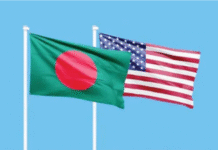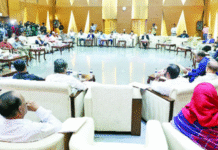A new US report has indicated a decrease in terrorist attacks worldwide in 2016, but a significant increase in such activities in Bangladesh.
It said the total number of terrorist attacks in 2016 decreased by 9 percent, and total deaths due to terrorist attacks fell by 13 percent from 2015.
Bangladesh experienced a “significant increase in terrorist activity” in 2016, according to the report that also highlighted the measures the government had taken to counter violent extremism.
Transnational groups such as ISIS and AQIS have claimed several attacks targeting foreigners, religious minorities, police, secular bloggers, and publishers.

Most notably, ISIS claimed responsibility for the July 1 attack on a restaurant in Dhaka’s diplomatic enclave, which resulted in 22 deaths.“The Government of Bangladesh primarily attributed these attacks to domestic terrorists and political opposition.”
The report said the global decrease was largely due to fewer attacks and deaths from terrorist attacks in Afghanistan, Syria, Nigeria, Pakistan, and Yemen.
At the same time, the report said, there was an increase in terrorist attacks and total deaths in several countries, including Iraq, Somalia, and Turkey.
On the other hand, Bangladesh in 2016 witnessed an unprecedented terrorist attack in a cafe inside the diplomatic zone.
According to the report, the ISIS claimed responsibility for 18 attacks in Bangladesh in 2016; the most significant being the one on the Holey Artisan Bakery, frequented by the foreigners.
“The other attacks were generally machete attacks on individuals from minority groups or law enforcement entities.”
AQIS claimed responsibility for two attacks in 2016 — the April 6 murder of an online Bangladeshi activist and the April 25 killing of a US embassy local employee and his friend.

Police say militants had their lair on the fifth floor of this building named `Taj Manzil’ on Road No.5 in Kalyanpur. Photo: abdul mannan
Throughout the year, Bangladesh suffered several other small-scale attacks for which there were no public claims of responsibility, including the July 7 bomb blast at an Eid-gathering in Sholakia that killed four people – including two police officers – and injured seven.According to the report, the ISIS was responsible for more attacks and deaths than any other perpetrator group in 2016. In 2015, it was the Taliban that was responsible for more attacks and deaths.
And although terrorist attacks took place in 104 countries in 2016, they were heavily concentrated geographically, as they have been for the past several years.
Fifty-five percent of all attacks took place in Iraq, Afghanistan, India, Pakistan, and the Philippines, and 75 percent of all deaths due to terrorist attacks that took place in Iraq, Afghanistan, Syria, Nigeria, and Pakistan.
The report said the Bangladesh government has articulated a zero-tolerance policy towards terrorism, made numerous arrests of terrorist suspects, and continued its counterterrorism cooperation with the international community.
Terrorist organisations used social media to spread their radical ideologies and solicit followers from Bangladesh. Bangladesh was featured in multiple publications, videos, and websites associated with ISIS and AQIS.
The report said Bangladesh continued to participate in the Department of State’s Antiterrorism Assistance program and received counterterrorism-focused training for law enforcement officers.
It also received Department of Justice prosecutorial skills training, and community policing support in targeted areas of the country.
Despite lacking laws specific to foreign terrorist fighters, Bangladesh has arrested suspected foreign terrorist fighters or facilitators of such fighters on other charges under existing law.
The report also said the Department of State is working with Bangladesh to assist in developing a “screening infrastructure” to better secure its borders.
“Bangladesh does not have an interactive advanced passenger information system,” it said.
“Bangladesh cooperated with the United States to further strengthen control of its borders and land, sea, and air ports of entry”.
The report mentioned different raids on terrorists dens and said “observers believe at least some of the raids are staged by law enforcement, particularly the RAB”.
On financial management, the report said while the country faces significant domestic terrorist finance risks, Bangladesh law enforcement and intelligence agencies demonstrate a strong understanding of these risks.
“Still, the judicial sector is under-resourced for carrying out prosecutions and obtaining convictions and the banking and non-banking sectors require further implementation of preventative measures such as customer due diligence and suspicious transaction reports.”
Bangladesh shared law enforcement information with INTERPOL but does not have “a dedicated terrorist watchlist”.
‘Country Reports on Terrorism 2016’ is submitted in compliance with Title 22 of the United States Code, Section 2656f (the “Act”), which requires the Department of State to provide to Congress a full and complete annual report on terrorism for those countries and groups meeting the criteria of the Act.
Beginning with the report for 2004, it has replaced the previously published ‘Patterns of Global Terrorism’.
Source: bdnews24









